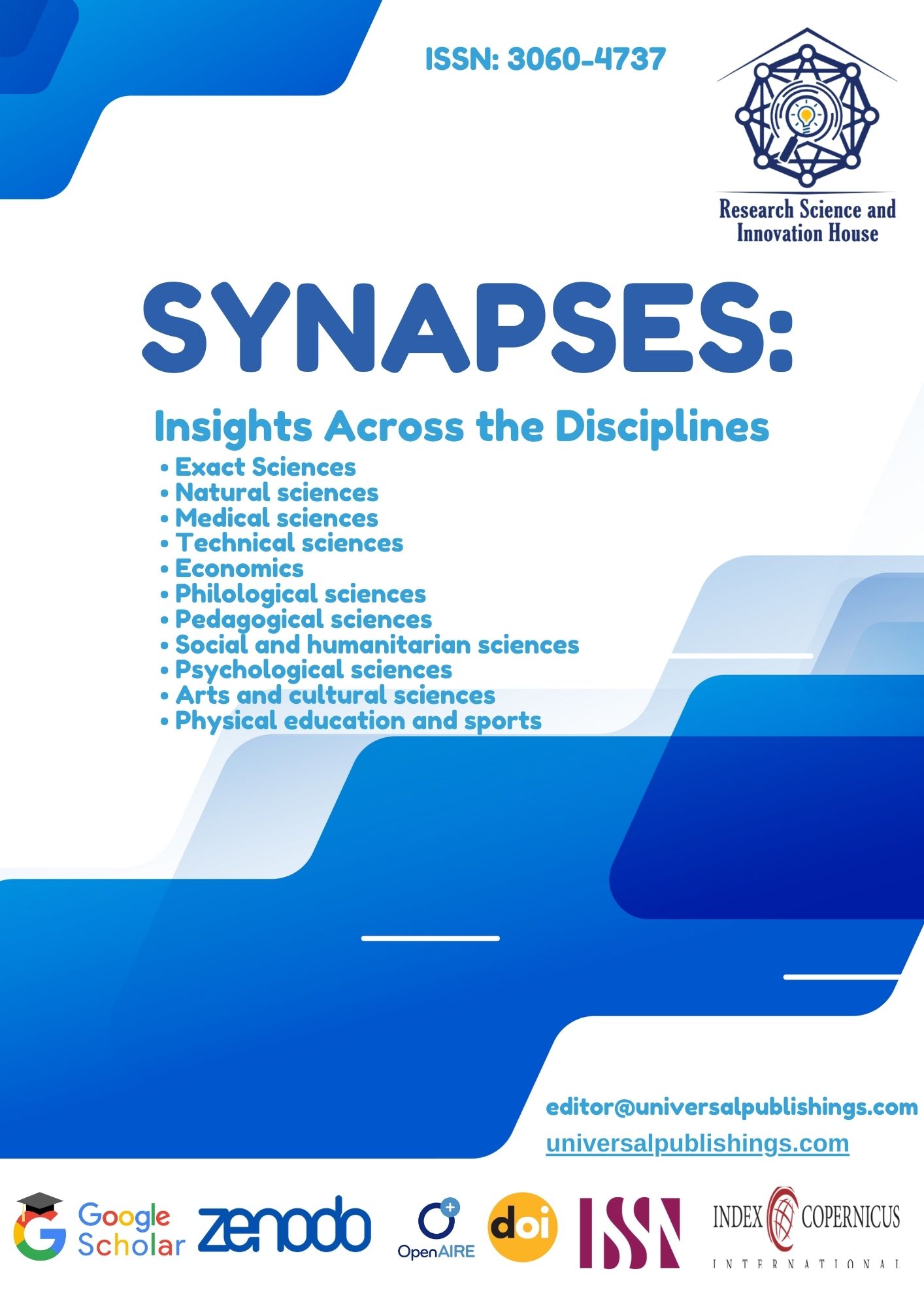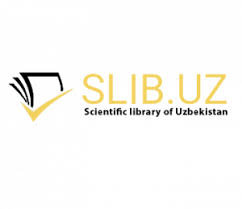ROBOT MANIPULATOR CONTROL SYSTEMS COMPARISON WITHIN THE CONCEPTS INDUSTRY 5.0 AND INDUSTRY 4.0
Abstract
The article explores the differences in approaches to control systems
for manipulator robots within the concepts Industry 4.0 and Industry 5.0. The main
requirements for classical control systems focused on automation and autonomy and
collaborative systems that take into account interactivity and adaptability for close
interaction with a person are analyzed. The comparative analysis highlights the
advantages and challenges of each approach, suggesting directions for further
developments in the field of adaptive and safe robotics systems.
References
1. Abu-Jassar, A., & et al. (2024). The Optical Flow Method and Graham’s
Algorithm Implementation Features for Searching for the Object Contour in
the Mobile Robot’s Workspace.
SYNAPSES: Insights Across the
Disciplines
Volume 1, Issue 5
123 Synapses: Insights Across the Disciplines
2. Yevsieiev, V., & et al. (2024). The Canny Algorithm Implementation for
Obtaining the Object Contour in a Mobile Robot’s Workspace in Real Time.
Journal of Universal Science Research, 2(3), 7-19.
3. Maksymova, S., & et al. (2024). Comparative Analysis of methods for
Predicting the Trajectory of Object Movement in a Collaborative RobotManipulator Working Area. Multidisciplinary Journal of Science and
Technology, 4(10), 38-48.
4. Vizir, Y., & et al. (2024). Lighting Control Module Software Development.
Journal of Universal Science Research, 2(2), 29–42.
5. Abu-Jassar, A., & et al. (2023). Obstacle Avoidance Sensors: A Brief Overview.
Multidisciplinary Journal of Science and Technology, 3(5), 4-10.
6. Akopov, M., & et al. (2023). Choosing a Camera for 3D Mapping. Journal of
Universal Science Research, 1(11), 28–38.
7. Attar, H., Abu-Jassar, A. T., Amer, A., Lyashenko, V., Yevsieiev, V., &
Khosravi, M. R. (2022). Control System Development and Implementation of
a CNC Laser Engraver for Environmental Use with Remote Imaging.
Computational intelligence and neuroscience, 2022(1), 9140156.
8. Abu-Jassar, A. T., Al-Sharo, Y. M., Lyashenko, V., & Sotnik, S. (2021). Some
Features of Classifiers Implementation for Object Recognition in Specialized
Computer systems. TEM Journal: Technology, Education, Management,
Informatics, 10(4), 1645-1654.
9. Nevliudov, I., Yevsieiev, V., Baker, J. H., Ahmad, M. A., & Lyashenko, V.
(2020). Development of a cyber design modeling declarative Language for
cyber physical production systems. J. Math. Comput. Sci., 11(1), 520-542.
10.Abu-Jassar, A. T., Attar, H., Yevsieiev, V., Amer, A., Demska, N., Luhach, A.
K., & Lyashenko, V. (2022). Electronic User Authentication Key for Access to
HMI/SCADA via Unsecured Internet Networks. Computational intelligence
and neuroscience, 2022, 5866922.
11.Mustafa, S. K., Yevsieiev, V., Nevliudov, I., & Lyashenko, V. (2022). HMI
Development Automation with GUI Elements for Object-Oriented
Programming Languages Implementation. SSRG International Journal of
Engineering Trends and Technology, 70(1), 139-145.
12.Nevliudov, I., Yevsieiev, V., Lyashenko, V., & Ahmad, M. A. (2021). GUI
Elements and Windows Form Formalization Parameters and Events Method to
Automate the Process of Additive Cyber-Design CPPS Development.
Advances in Dynamical Systems and Applications, 16(2), 441-455.
SYNAPSES: Insights Across the
Disciplines
Volume 1, Issue 5
124 Synapses: Insights Across the Disciplines
13.Maksymova, S., Matarneh, R., Lyashenko, V. V., & Belova, N. V. (2017). Voice
Control for an Industrial Robot as a Combination of Various Robotic Assembly
Process Models. Journal of Computer and Communications, 5, 1-15.
14.Lyashenko, V., Abu-Jassar, A. T., Yevsieiev, V., & Maksymova, S. (2023).
Automated Monitoring and Visualization System in Production. International
Research Journal of Multidisciplinary Technovation, 5(6), 9-18.
15.Ahmad, M. A., Baker, J. H., Tvoroshenko, I., & Lyashenko, V. (2019).
Modeling the structure of intellectual means of decision-making using a
system-oriented NFO approach. International Journal of Emerging Trends in
Engineering Research, 7(11), 460-465.
16.Lyashenko, V., Ahmad, M. A., Sotnik, S., Deineko, Z., & Khan, A. (2018).
Defects of communication pipes from plastic in modern civil engineering.
International Journal of Mechanical and Production Engineering Research and
Development, 8(1), 253-262.
17.Lyashenko, V. V., Matarneh, R., & Deineko, Z. V. (2016). Using the Properties
of Wavelet Coefficients of Time Series for Image Analysis and Processing.
Journal of Computer Sciences and Applications, 4(2), 27-34.
18.Lyashenko, V. V., Matarneh, R., Kobylin, O., & Putyatin, Y. P. (2016). Contour
Detection and Allocation for Cytological Images Using Wavelet Analysis
Methodology. International Journal, 4(1), 85-94.
19.Abu-Jassar, A. T., Attar, H., Lyashenko, V., Amer, A., Sotnik, S., & Solyman,
A. (2023). Access control to robotic systems based on biometric: the
generalized model and its practical implementation. International Journal of
Intelligent Engineering and Systems, 16(5), 313-328.
20.Al-Sharo, Y. M., Abu-Jassar, A. T., Sotnik, S., & Lyashenko, V. (2023).
Generalized Procedure for Determining the Collision-Free Trajectory for a
Robotic Arm. Tikrit Journal of Engineering Sciences, 30(2), 142-151.
21.Sotnik, S., & Lyashenko, V. (2022). Prospects for Introduction of Robotics in
Service. Prospects, 6(5), 4-9.
22.Lyashenko, V., Laariedh, F., Ayaz, A. M., & Sotnik, S. (2021). Recognition of
Voice Commands Based on Neural Network. TEM Journal: Technology,
Education, Management, Informatics, 10(2), 583-591.
23.Tahseen A. J. A., & et al.. (2023). Binarization Methods in Multimedia Systems
when Recognizing License Plates of Cars. International Journal of Academic
Engineering Research (IJAER), 7(2), 1-9.
SYNAPSES: Insights Across the
Disciplines
Volume 1, Issue 5
125 Synapses: Insights Across the Disciplines
24.Abu-Jassar, A. T., Attar, H., Amer, A., Lyashenko, V., Yevsieiev, V., & Solyman,
A. (2024). Development and Investigation of Vision System for a Small-Sized
Mobile Humanoid Robot in a Smart Environment. International Journal of
Crowd Science.
25.Sotnik, S., & et al.. (2022). Modern Industrial Robotics Industry. International
Journal of Academic Engineering Research, 6(1),. 37-46.
26.Attar, H., Abu-Jassar, A. T., Lyashenko, V., Al-qerem, A., Sotnik, S., Alharbi,
N., & Solyman, A. A. (2023). Proposed synchronous electric motor simulation
with built-in permanent magnets for robotic systems. SN Applied Sciences,
5(6), 160.
27.Babker, A. M., Suliman, R. S., Elshaikh, R. H., Boboyorov, S., & Lyashenko,
V. (2024). Sequence of Simple Digital Technologies for Detection of Platelets
in Medical Images. Biomedical and Pharmacology Journal, 17(1), 141-152.
28.Lyashenko V, Matarneh R, Sotnik S. Modeling of Machine Design with
Numerical Control in UG NX 7.5 System. The International Journal of
Engineering and Science (IJES), 2018, 7(7), pp. 28-37.
29.Matarneh, R., Sotnik, S., & Lyashenko, V. (2018). Search of the molding form
connector plane on the approximation basis by the many-sided surface with use
of the convex sets theory. International Journal of Mechanical and Production
Engineering Research and Development, 8(1), 977-988.
30.Omarov, M., Muradova, V., & Lyashenko, V. (2020). Model of accumulation
and loss of knowledge in computerization systems of education with remote
access. International Journal of Emerging Trends in Engineering Research,
8(3), 847-852.
31.Maksymova, S., & et al. (2024). The Bipedal Robot a Kinematic Diagram
Development. Journal of Universal Science Research, 2(1), 6–17.
32.Basiuk, V., & et al. (2023). Mobile Robot Position Determining Using
Odometry Method. Multidisciplinary Journal of Science and Technology, 3(3),
227-234.
33.Gurin, D., & et al. (2024). Effect of Frame Processing Frequency on Object
Identification Using MobileNetV2 Neural Network for a Mobile Robot.
Multidisciplinary Journal of Science and Technology, 4(8), 36-44.
34.Nevliudov, I., & et al. (2023). A Small-Sized Robot Prototype Development
Using 3D Printing. CAD In Machinery Design Implementation and
Educational Issues (CADMD'2023) Suprasl, 12.
SYNAPSES: Insights Across the
Disciplines
Volume 1, Issue 5
126 Synapses: Insights Across the Disciplines
35.Maksymova, S., & et al. (2024). Gripping Device Development: Some Aspects.
Journal of Universal Science Research, 2(1), 150–158.
36.Yevsieiev, V., & et al. (2024). Building a traffic route taking into account
obstacles based on the A-star algorithm using the python language. Technical
Science Research In Uzbekistan, 2(3), 103-112.
37.Lyashenko, V., & Sotnik, S. (2020). Analysis of Basic Principles for Sensor
System Design Process Mobile Robots. Journal La Multiapp, 1(4), 1-6.
38.Abu-Jassar AT, Attar H, Amer A, et al. Remote Monitoring System of Patient
Status in Social IoT Environments Using Amazon Web Services (AWS)
Technologies and Smart Health Care. International Journal of Crowd Science,
2024.
39.Matarneh, R., Maksymova, S., Zeleniy, O., & Lyashenko, V. (2018). Voice
Control for Flexible Medicine Robot. International Journal of ComputerTrends
and Technology (IJCTT), 56(1), 1-5.
40.Putyatin, Y. P., & et al.. (2016) The Pre-Processing of Images Technique for the
Material Samples in the Study of Natural Polymer Composites. American
Journal of Engineering Research, 5(8), 221-226.
41.Lyashenko, V., Kobylin, O., Ahmad, M. A., & Khan, A. (2017). Study of
composite materials for the engineering using wavelet analysis and image
processing technology. International Journal of Mechanical and Production
Engineering Research and Development, 7(6), 445-452.
42.Kemendi, Á., & et al. (2022). Industry 4.0 and 5.0–organizational and
competency challenges of enterprises. Polish Journal of Management Studies,
26(2), 209-232.
43.Xu, X., & et al. (2021). Industry 4.0 and Industry 5.0—Inception, conception
and perception. Journal of manufacturing systems, 61, 530-535.
44.Golovianko, M., & et al. (2023). Industry 4.0 vs. Industry 5.0: Co-existence,
transition, or a hybrid. Procedia Computer Science, 217, 102-113.
45.Mourtzis, D., & et al. (2022). A Literature Review of the Challenges and
Opportunities of the Transition from Industry 4.0 to Society 5.0. Energies,
15(17), 6276.
46.Raja Santhi, A., & Muthuswamy, P. (2023). Industry 5.0 or industry 4.0 S?
Introduction to industry 4.0 and a peek into the prospective industry 5.0
technologies. International Journal on Interactive Design and Manufacturing
(IJIDeM), 17(2), 947-979.
SYNAPSES: Insights Across the
Disciplines
Volume 1, Issue 5
127 Synapses: Insights Across the Disciplines
47.Zizic, M. C., & et al. (2022). From industry 4.0 towards industry 5.0: A review
and analysis of paradigm shift for the people, organization and technology.
Energies, 15(14), 5221.
48.Jefroy, N., & et al. (2022). Moving from Industry 4.0 to Industry 5.0: what are
the implications for smart logistics?. Logistics, 6(2), 2644.Golovianko, M., & et al. (2023). Industry 4.0 vs. Industry 5.0: Co-existence,
transition, or a hybrid. Procedia Computer Science, 217, 102-113.
45.Mourtzis, D., & et al. (2022). A Literature Review of the Challenges and
Opportunities of the Transition from Industry 4.0 to Society 5.0. Energies,
15(17), 6276.





























